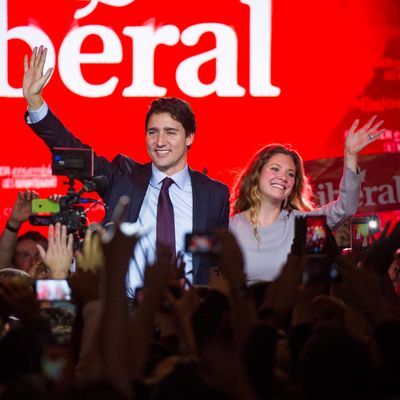
Canadian prime minister Stephen Harper and his Conservative Party were voted out of office on Monday night in a stunning change that may or may not have something to do with John Oliver’s willingness to break Canadian election laws. The Liberal Party won 185 of the 338 seats in Parliament, according to the New York Times, making Justin Trudeau the nation’s first new prime minister in nearly a decade.
Justin Trudeau is the son of late Prime Minister Pierre Trudeau, who rose to power in 1968 in a wave of excitement dubbed “Trudeaumania.” He remained in office until 1984 (with one brief interruption) and is credited with establishing Canada’s version of the bill of rights, its bilingualism, and its policy of multiculturalism. (Pre-Rob Ford, if Americans could name one Canadian politician, it was probably Trudeau.)
Conservative ads in the current election described the younger Trudeau as, “Just not ready.” Trudeau, who previously worked as a high-school teacher, only entered politics in 2007, when he was elected to Parliament from a Montreal district that traditionally did not vote Liberal. He became the leader of the Liberal Party in 2013, and helped revive the party after it suffered its worst defeat ever in 2011, winning only 34 seats and finishing third behind the New Democrat Party. At 43, Trudeau will be the second-youngest prime minister in Canadian history and the first whose parent has held the position.
The defeat is particularly bitter for Harper, as he spent his career fighting the Liberal hold on Canadian politics ushered in by Trudeau. (After Trudeau’s death in 2000, Harper wrote, “[H]e continues to define the myths that guide the Canadian psyche, but myths they are.”) With his push for smaller government, his claim that marijuana is “infinitely worse” than tobacco, and his hawkishness on foreign affairs, Harper has been accused of being closer to an American Republican than a moderate Canadian Conservative. Harper had focused on his success at shielding Canada from the worst of the global financial crisis, but his policies were criticized after the Canadian economy contracted in the first half of 2015. He made his opposition to wearing niqab during the citizenship oath, among other “barbaric cultural practices,” a campaign issue, drawing accusations of Islamophobia.
Harper conceded on Monday night and said in a brief statement that he would step down as the Conservative Party’s leader. “The people are never wrong,” Harper said. “The disappointment is my responsibility and mine alone.”
In his victory speech, Trudeau said the Liberal Party won because it put forward an optimistic message. “This is what positive politics can do,” he told supporters. “We beat cynicism with hard work. We beat negative, divisive politics with a positive vision that brings Canadians together. Most of all we defeated the idea that Canadians should be satisfied with less.”
Trudeau’s victory is expected to ease Canada’s relations with the United States. Harper had clashed with the Obama administration on several issues, including the Iran nuclear deal and the Keystone XL pipeline. Trudeau supports the pipeline as well, but has said that the relationship between the two nations shouldn’t hinge on one issue. He accused Harper of hurting the Canadian economy simply because he “doesn’t like Barack Obama,” and said last week, “It’ll be one of my most crucial priorities to begin once again having a productive and constructive relationship with our closest ally and neighbor.”






























